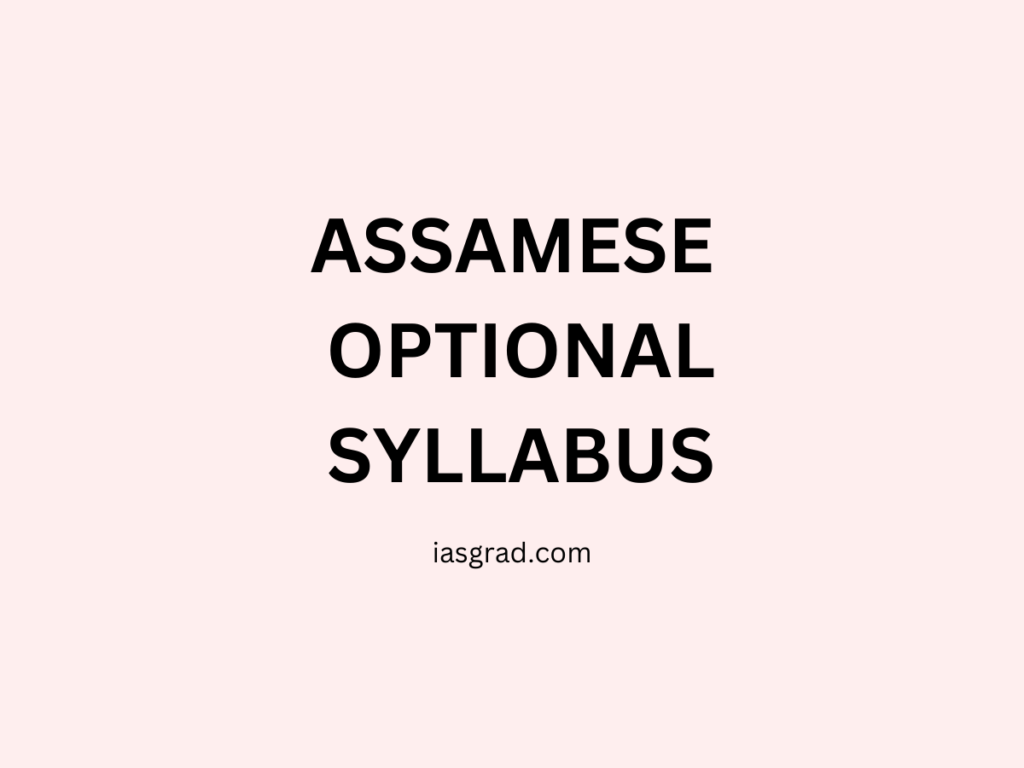Assamese Optional Syllabus
The Assamese Optional for the UPSC Civil Services Exam is a popular choice for candidates with a strong background in Assamese literature, culture, and language. The syllabus covers a wide range of topics including the history of the Assamese language, its grammatical structure, literary criticism, and a detailed study of classical and modern texts. It also includes the study of cultural traditions, folklore, and prominent literary works. This subject is ideal for aspirants who have an interest in Assamese literature and are comfortable with in-depth textual analysis and literary history. This post provides a detailed breakdown of the syllabus.
Paper I: Assamese Optional Syllabus
-
Language:
- History of the origin and development of the Assamese Language —its position among the IndoAryan language—periods in its history.
- Development of Assamese prose.
- Vowels and consonants of the Assamese Language—Rules of phonetic changes with stress on Assamese coming down from Old Indo-Aryan.
- Assamese vocabulary—and its sources.
- Morphology of the language—conjugation—enclitic definitives and pleonastic suffixes.
- Dilectical divergences—the Standard colloquial and the Kamrupi dialect in particular.
- Assamese script—its evolution through the ages till 19th century A.D.
-
Literary Criticism and Literary History:
- Principles of literary criticism up to New criticism.
- Different literary genres.
- Development of literary forms in Assamese.
- Development of literary criticism in Assamese.
- Periods of the literary history of Assam from the earliest beginnings, i.e. from the period of the charyyageeta with their socio-cultural background : the proto Assamese Pre-Sankaradeva— Sankaradeva—Post-Sankaradeva—Modern period (from the coming of the Britishers)—PostIndependence period. Special emphasis is to be given on the Vaisnavite period, the gonaki and the post-independence periods.
Paper II: Assamese Optional Syllabus
-
Section A
- Ramayana (Ayodhya Kanda —by Madhava Kandali only)
- Parijat-Harana — by Sankaradeva.
- Rasakrida — by Sankaradeva (From Kirtana Ghosa)
- Bargeet — by Madhavadeva.
- Rajasuya — by Madhavadeva.
- Katha-Bhagavata(Books I and II) — by Baikurthanath Bhattacharyya.
- Gurucarit-Katha (Sankaradeva’s Part only) — ed. by Maheswar Neog.
-
Section B
- Mor Jeevan Sonwaran — by Lakshminath Bezbaroa.
- Kripabar BorbaruarKakatar Topola — by Lakshminath Bezbaroa.
- Pratima — by Chandra KumarAgarwalla.
- Gaonburha — by Padmanath GohainBarua.
- Manomati — by Rajanikanta Bordoloi.
- Purani Asamiya Sahitya — by Banikanta Kakati.
- Karengar Ligiri — by Jyotiprasad Agarwalla
- Jeevanar Batat — by Bina Barva(BirinchiKumar Barua)
- Mrityunjoy — by Birendrakumar Bhattacharyya
- Samrat —by Navakanta Barua
